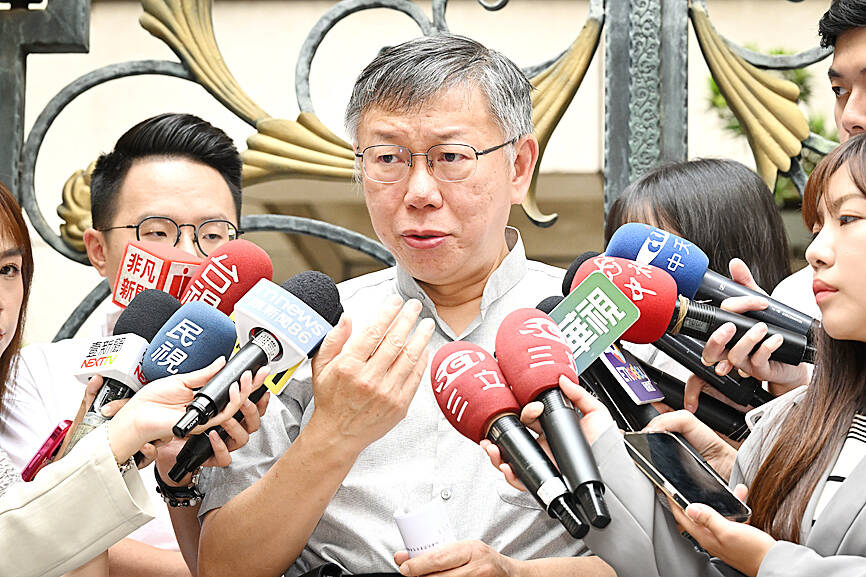The Taiwan People’s Party (TPP) would initiate reform mechanisms to prevent political donation disclosure errors and promptly deal with any future incidents, TPP Chairman Ko Wen-je (柯文哲) said yesterday.
The TPP and Ko, the party’s presidential candidate in the Jan. 13 elections, have been questioned by political pundits and local media last week about allegedly declaring false political donation income and expenses to the Control Yuan, while the Taipei District Prosecutors’ Office and Ministry of Justice Investigation Bureau started to investigate the issue.
There have allegedly been overlapping members in Ko’s election campaign office and marketing companies the party commissioned for promotional services.

Photo: Chen Yi-kuan, Taipei Times
SUSPICIONS
Facing several accusations and speculations, the TPP last week admitted some donation expenditure records were flawed, saying that an accountant is responsible for the flawed records.
The party said it would go through all the donation records to check for errors.
However, more questions about the party’s political donation disclosure data have been raised.
Taipei City Councilor Lin Liang-chun (林亮君) on Saturday questioned in a Facebook post why up to about 97 percent of the “donation income from individuals” to Ko’s election campaign was in “cash,” while most of his supporters are believed to be young people that are expected to be familiar with digital financial instruments.
She alleged that the party and Ko had misreported all the online donations as cash donations to the Control Yuan.
“You can tell it’s a mistake at a glance. The wrong category [cash] was checked,” Ko told reporters yesterday.
The TPP received about 180,000 donations in all, and they have reviewed about one-third of the records, he said.
MECHANISMS
The issue has dragged on for a week, and the party has reflected on the problems, learned from the bitter experience and would initiate a reform, he said.
First, the party would reinstate a “financial supervision committee,” which was not operating during the presidential election campaign, he said, adding that only one or two people were in charge of the income and expenditure accounts and many duties were outsourced, which was a big problem.
The party headquarters should establish a digital account system, which can be used with a donations account in elections, Ko said.
Digitalizing data would prevent mistakes from manually logging them in, he said.
Second, the party should have “long-term cooperation with a group of lawyers,” as political parties are often involved in legal matters, he said.
Third, the TPP should re-establish a “response task force,” which it used to have, he said, adding that how the party has handled the recent accusations is “out of tune.”
Ko said he has asked TPP Legislator Vivian Huang (黃珊珊), who was the campaign office manager, to head a task force to deal with the aftermath of the political donation disclosure problems, and that the party is to hold a news conference every day to explain their review process.

POSITIVE DEVELOPMENT: Japan and the US are expected to hold in-depth discussions on Taiwan-related issues during the meeting next month, Japanese sources said The holding of a Japan-US leaders’ meeting ahead of US President Donald Trump’s visit to China is positive news for Taiwan, former Japan-Taiwan Exchange Association representative Hiroyasu Izumi said yesterday. After the Liberal Democratic Party’s landslide victory in Japan’s House of Representatives election, Japanese Prime Minister Sanae Takaichi is scheduled to visit the US next month, where she is to meet with Trump ahead of the US president’s planned visit to China from March 31 to April 2 for a meeting with Chinese President Xi Jinping (習近平). Japan and the US are expected to hold in-depth discussions on Taiwan-related issues during the

‘LIKE-MINDED PARTNER’: Tako van Popta said it would be inappropriate to delay signing the deal with Taiwan because of China, adding he would promote the issue Canadian senators have stressed Taiwan’s importance for international trade and expressed enthusiasm for ensuring the Taiwan-Canada trade cooperation framework agreement is implemented this year. Representative to Canada Harry Tseng (曾厚仁) in an interview with the Central News Agency (CNA) said he was increasingly uneasy about Ottawa’s delays in signing the agreement, especially as Ottawa has warmed toward Beijing. There are “no negotiations left. Not only [is it] initialed, we have three versions of the text ready: English, French and Mandarin,” Tseng said. “That tells you how close we are to the final signature.” Tseng said that he hoped Canadian Prime Minister Mark Carney

President William Lai (賴清德) yesterday bestowed one of Taiwan’s highest honors on Saint Vincent and the Grenadines (SVG) Ambassador Andrea Clare Bowman in recognition of her contributions to bilateral ties. “By conferring the Order of Brilliant Star with Grand Cordon on Ambassador Bowman today, I want to sincerely thank her, on behalf of the Taiwanese people, for her outstanding contribution to deepening diplomatic ties between Taiwan and SVG,” Lai said at a ceremony held at the Presidential Office in Taipei. He noted that Bowman became SVG’s first ambassador to Taiwan in 2019 and

A man walks past elementary school artworks at the Taipei Lantern Festival in Ximen District yesterday, the first day of the event. The festival is to run from 5pm to 10pm through March 15.